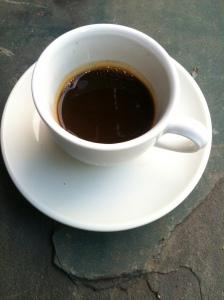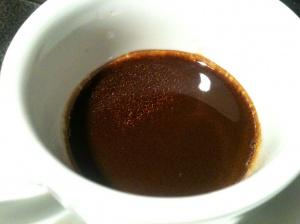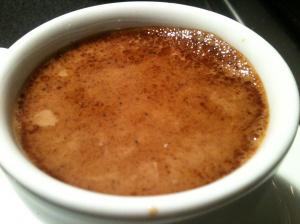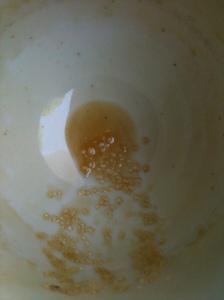![IMG_3029[1] Coffee with Hazelnuts](http://m5.paperblog.com/i/22/225471/coffee-with-hazelnuts-L-EHfnCa.jpeg)
Coffee, Hazelnuts and Cardamom
For the preparation of this coffee I took an Italian coffee pot, known to some as espresso pot/cooker. My key rule with these interesting and difficult pots is to avoid using too much water. Their filters, the cavity where the coffee is put into, are in my view always much too small in relation to their water cavity. Or it is perhaps the other way around: for the amount of water that each could hold, the space for the coffee powder is too small. By this relationship the coffee produced on the top half is not well-rounded – too watery. They usually have marks to ensure one does not fill them with too much water, but even these marks I consider to be engraved much to high.
Precisely that is part of why they are difficult to operate. It requires some practice figuring out the right amount of water to pour into each specific pot, then supplying the proper density when filling the filter with the coffee powder and finally using the flame or the heat amount at the proper, most effective level, so the brew comes out at its best, with a full taste, and most of all, without a burnt taste. I find the later to be a major problem with these pots and the steps just mentioned should help avoid this. If the water does not get too hot too fast, it will ascend with a good speed, given the coffee is not too densely packed. This way the water steams smoothly and not so abrupt and bubbly. Something highly important to avoid is leaving the pot too long on the fire, after most of the water that could steam up, has already done it. Many leave them unattended while they spend their time with other preparations in the bathroom or are busy elsewhere. When your hear the bubbles reach a certain sound, but let the water boil incessantly, you will obtain a burnt taste in your coffee.

I wonderful, oily and dense brew.
The only coffee preparation method by which I do not use the very least water possible, is when preparing a (Turkish or Greek) Mocha. Otherwise my taste says clearly that the water should be forced through much coffee, instead of letting the coffee swim in water.In the very end, what counts is the taste – almost only the taste.
Apparently it is the high level of fat in the hazelnuts what made an oil became visible. For the taste it was a definite advantage, giving it a very creamy texture as known when using cream, but without having the taste of cream and oil in the mouth. I was more than impressed with the taste for tongue and palate. My eyes, mind and imagination were right.

Oil from the Hazelnuts

… with milk and an agreeable creamy feel, without the typical taste of oily cream.

In the end also some undrinkable coffee rests.
![IMG_3055[1] Coffee with Hazelnuts](http://m5.paperblog.com/i/22/225471/coffee-with-hazelnuts-L-rDilH9.jpeg)
Coffee Cooker on Fire

